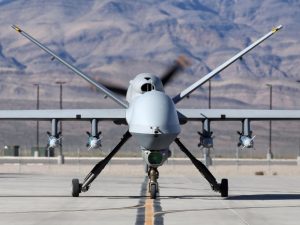The U.S. military carried out its first ever drone strike against al-Qaida militants in southern Libya this weekend, signaling a possibly significant expansion of the American counterterrorism campaign in the North African nation, like reported by tampabay.com.
Until now, the Pentagon had focused its counterterrorism strikes in Libya almost exclusively on Islamic State fighters and operatives farther north — eight since President Donald Trump took office. In 2016, the military conducted nearly 500 airstrikes in the coastal city of Sirte over several months to destroy the Islamic State’s stronghold there.
But the attack Saturday that the military’s Africa Command said had killed two militants — later identified by a spokeswoman as belonging to al-Qaida’s branch in northwestern Africa — took place in the country’s southwest, a notorious haven for a deadly mix of al-Qaida and other extremist groups that also operate in the Sahel region of Niger, Chad, Mali and Algeria.
“This appears to be the continuation of expanding AFRICOM activity in Libya’s ungoverned areas,” said Deborah K. Jones, who served as U.S. ambassador to Libya from 2013 to 2015, referring to the Africa Command.
A missile fired by the U.S. drone struck a house in Ubari, 435 miles south of Tripoli, in an area close to major oil fields that was wracked by violent ethnic feuding in 2015. In a statement, the military’s Africa Command said the strike had targeted militants with al-Qaida in the Islamic Maghreb, an affiliate also known as AQIM, and had been carried out in coordination with the U.N.-backed unity government in Tripoli. “At this time, we assess no civilians were killed in this strike,” the statement said.
The strike came as the Trump administration has been reassessing the U.S. military commitment in North and West Africa after the ambush in Niger last fall that killed four U.S. soldiers. The Pentagon has been preparing to fly armed drone missions from Niger’s capital, Niamey, a step that diplomats and analysts say could further widen the Pentagon’s shadow war in this part of the continent.
Ubari is at the intersection of the powerful criminal and jihadi currents that have washed across Libya in recent years. Roughly equidistant from Libya’s borders with Niger, Chad and Algeria, the area’s seminomadic tribesmen are heavily involved in the smuggling of weapons, drugs and illegal migrants through the lawless deserts of southern Libya.
Some have allied with Islamist militias, including al-Qaida in the Islamic Maghreb, which operates across Algeria, Mali, Niger and Libya.
In the statement Saturday, Robyn M. Mack, a spokeswoman for the U.S. Africa Command, said that it was still assessing the results of the strike and that the purpose had been “to deny terrorists freedom of action and degrade their ability to reconsolidate.”
But the command did not answer several questions, including: To what extent is the attack the start of an escalating campaign against a broad spectrum of extremists in northwestern Africa, or a one-off strike against high-profile al-Qaida operatives?



